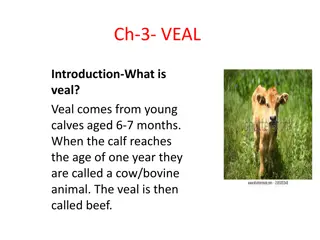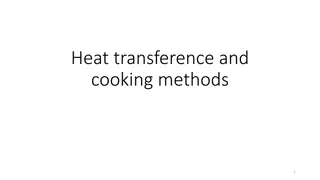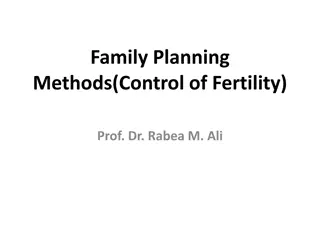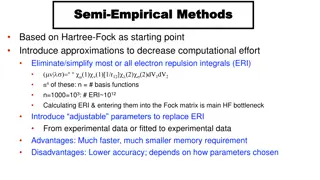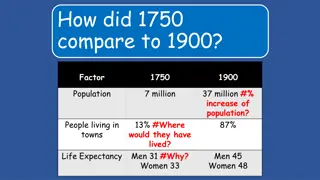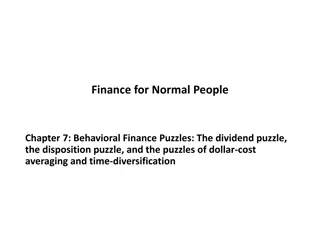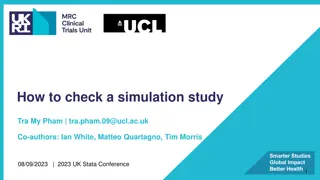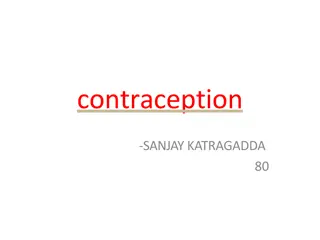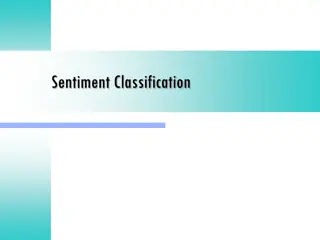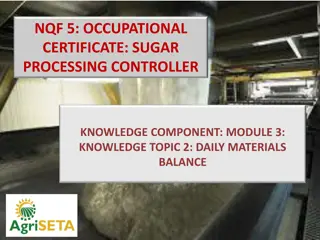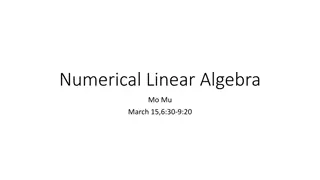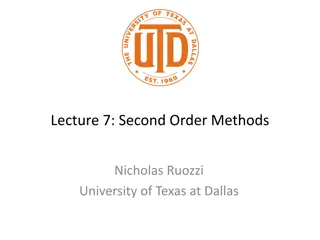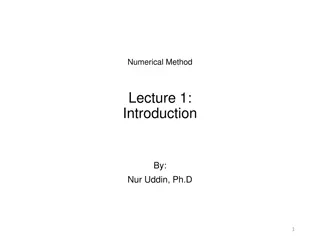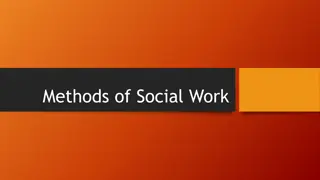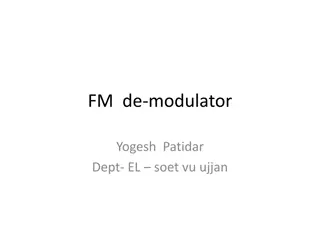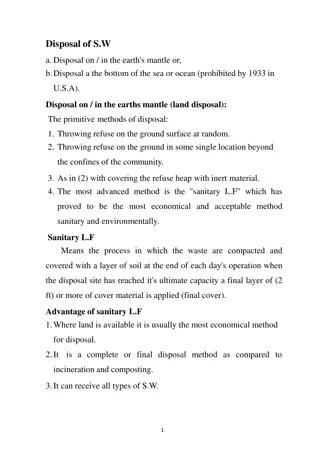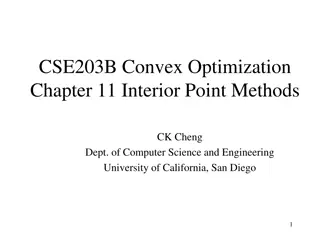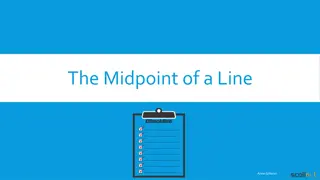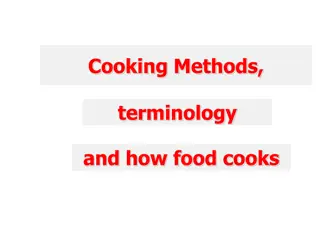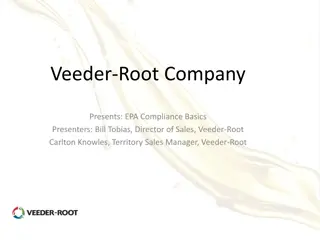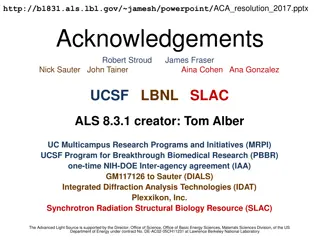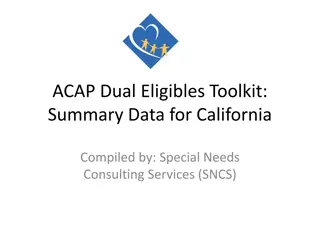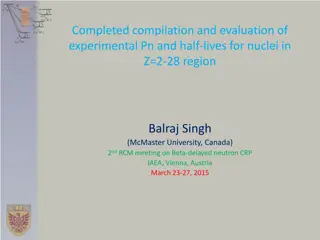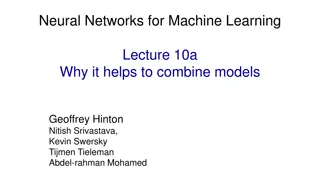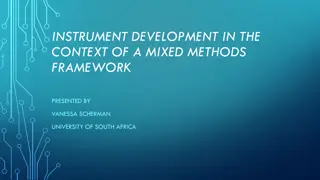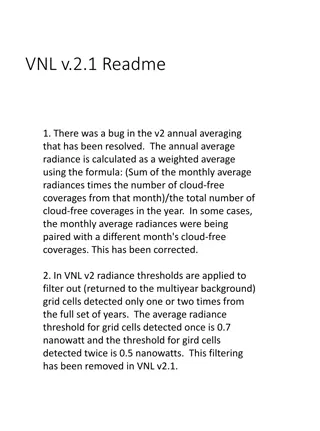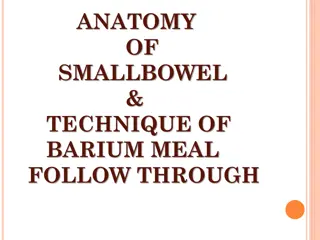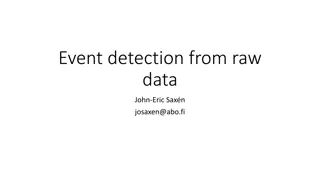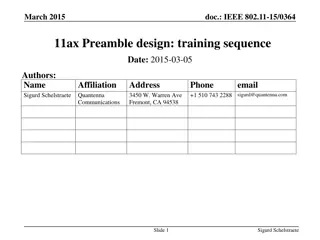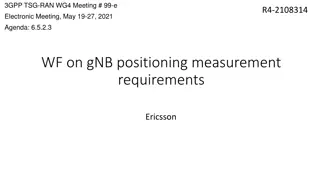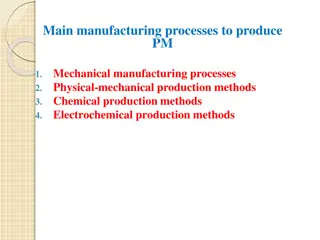Comprehensive Guide to Contraception and Birth Control Methods
Safe sex practices are crucial for preventing unplanned pregnancies and sexually transmitted infections (STIs). This guide discusses various contraception methods including barrier methods like male and female condoms, hormonal contraceptives such as oral pills, and their effectiveness rates. Cost,
0 views • 23 slides
Extension Teaching Methods
Extension teaching methods play a crucial role in facilitating communication and knowledge transfer between rural communities and extension workers. These methods aim to engage, stimulate, and guide learners through the process of acquiring new skills and knowledge. Centurion University in India emp
4 views • 8 slides
Understanding Veal: Types, Characteristics, Grading, and Cooking Methods
Veal is a tender meat sourced from young calves aged 6-7 months. It has a light color, fine texture, and smooth taste. Learn about different types of veal such as Bob Veal and Special-Fed Veal, as well as the grading system for veal carcasses. Discover the various cuts of veal and explore recommende
1 views • 9 slides
Understanding Heat Transfer and Cooking Methods
Explore the various methods of heat transfer and cooking techniques, including moist-heat and dry-heat methods. Learn about the objectives of heating foods, types of heat transfer such as conduction and convection, and how different methods affect the texture, flavor, and nutritional content of food
0 views • 21 slides
Comprehensive Guide to Natural Family Planning Methods
Family planning methods offer individuals control over their fertility through various contraception options, including natural methods like Basal Body Temperature (BBT), Rhythm method, Cervical Mucus/Ovulation method, and Sympto-thermal method. These techniques help in determining the fertile windo
5 views • 39 slides
Overview of Semi-Empirical Methods Based on Hartree-Fock
Semi-empirical methods derived from Hartree-Fock theory aim to reduce computational effort by approximating or eliminating electron repulsion integrals. Strategies include introducing adjustable parameters to replace ERI calculations and utilizing zero differential overlap methods like CNDO, INDO, N
1 views • 11 slides
Comparing 1750 to 1900: Population Growth in Britain
The population of Britain saw a significant increase between 1750 and 1900. In 1750, the population was 7 million, and by 1900, it had grown to 37 million. This represented an 87% increase. The number of people living in towns also rose from 13% to a higher percentage. Factors contributing to this g
0 views • 6 slides
Understanding Behavioral Finance Puzzles in Normal People's Finance
Behavioral finance puzzles delve into challenges like the dividend puzzle, the disposition puzzle, dollar-cost averaging, and time diversification. These puzzles combine wants for different benefits, cognitive and emotional errors, tools for correction, and implications of various theories for decis
0 views • 53 slides
How to Check a Simulation Study: Methods and Considerations
Simulation studies are often used to evaluate statistical methods and study power, but they can sometimes produce misleading results. This work discusses strategies to assess and improve the quality of simulation studies, drawing on experiences and considerations outlined in relevant literature. A s
0 views • 31 slides
Understanding Contraception: Methods, Importance, and Considerations
Contraception refers to methods used to prevent unwanted pregnancies, regulate pregnancy timing, and spacing between pregnancies. It is essential for women's reproductive health and can include barrier methods, hormonal methods, emergency contraception, and intrauterine devices. These methods are sa
3 views • 28 slides
Understanding Sentiment Classification Methods
Sentiment classification can be done through supervised or unsupervised methods. Unsupervised methods utilize lexical resources and heuristics, while supervised methods rely on labeled examples for training. VADER is a popular tool for sentiment analysis using curated lexicons and rules. The classif
7 views • 17 slides
Understanding Daily Materials Balance in Sugar Processing
The daily materials balance in sugar processing involves monitoring the performance of the extraction plant by tracking the tons of cane crushed and mixed juice produced. Key data needed include corrected brix and pol percentages, suspended solids, fibres, and more. Averaging methods and carrying fo
2 views • 30 slides
Comprehensive Overview of Numerical Linear Algebra Methods for Solving Linear Systems
Explore numerical linear algebra techniques for solving linear systems of equations, including direct and iterative methods. Delve into topics like Gaussian elimination, LU factorization, band solvers, sparse solvers, iterative techniques, and more. Gain insights into basic iterative methods, error
6 views • 12 slides
The Importance of Research Methods in Building Knowledge and Answering Questions
Research methods play a pivotal role in shaping how we construct knowledge, address research inquiries, and determine the questions we can explore. Practices in research are evolving with open-science initiatives, data sharing, and innovative methods across interdisciplinary fields. Objectives have
0 views • 21 slides
Optimization Methods: Understanding Gradient Descent and Second Order Techniques
This content delves into the concepts of gradient descent and second-order methods in optimization. Gradient descent is a first-order method utilizing the first-order Taylor expansion, while second-order methods consider the first three terms of the multivariate Taylor series. Second-order methods l
0 views • 44 slides
Introduction to Numerical Methods: A Comprehensive Overview
Numerical methods play a crucial role in solving mathematical problems efficiently through arithmetic operations. This lecture by Dr. Nur Uddin covers the fundamental concepts of numerical methods, emphasizing their importance in engineering problem-solving with the use of modern digital computers.
1 views • 17 slides
Understanding Methods of Social Work
Methods of social work encompass various approaches aimed at enhancing social functioning and addressing problems in individuals and communities. These methods are categorized into primary and secondary methods, each serving different purposes in the field. Primary methods involve direct interaction
0 views • 20 slides
Understanding FM Demodulators and Phase-Locked Loops
Explore the world of FM demodulators including Slope Detector, Foster-Seeley Discriminator, Ratio Detector, Pulse-Averaging Discriminators, Quadrature Detectors, and Phase-Locked Loops. Learn about demodulation, Foster-Seeley Discriminator operation, advantages, and disadvantages, as well as the con
3 views • 13 slides
Understanding Moving Averages and Exponential Smoothing Methods
Forecasting methods like moving averages and exponential smoothing are essential for analyzing time series data. Averaging methods involve equally weighted observations, while exponential smoothing methods assign unequal weights that decay exponentially. Both methods can be useful for forecasting in
0 views • 18 slides
Efficient Methods and Considerations for Solid Waste Disposal
Efficient methods for solid waste disposal include sanitary landfilling, which involves compacting waste and covering it with soil daily. Advantages of this method include economic viability and flexibility in waste disposal. However, challenges such as limited suitable land availability and potenti
0 views • 10 slides
Types of Birth Control Methods and Their Effectiveness
Explore the different types of birth control available, including abstinence, hormonal methods, barrier methods, and permanent methods. Learn about the effectiveness rates, how they work, and their pros and cons to make an informed decision about contraception. From hormonal options like pills, patc
0 views • 23 slides
Convex Optimization: Interior Point Methods Formulation
This chapter on interior point methods in convex optimization explores the formulation of inequality-constrained optimization problems using barrier methods and generalized inequalities. It covers primal-dual interior point methods and discusses issues such as exponential complexity and determining
0 views • 24 slides
Understanding the Midpoint of a Line Segment
Explore how to find the midpoint of a line segment through visual aids and practice exercises. Learn the formula for calculating the midpoint between two points on a line. Key points highlight the importance of averaging x and y coordinates. Start mastering geometric concepts with this comprehensive
0 views • 21 slides
Understanding Cooking Methods and Their Impact on Food
Cooking is not just about preparing food; it involves various methods that affect taste, texture, and nutrients. Different heat transfer methods play a crucial role in how food cooks, and understanding dry heat, moist heat, and combination cooking methods can help achieve desired results. From saut�
0 views • 23 slides
EPA Compliance Basics: Tank Leak Detection and Monitoring Methods
Learn about EPA requirements for tank leak detection, release detection methods, and compliance methods for monitoring tank systems. Understand the importance of implementing effective leak detection systems to prevent contamination and comply with federal regulations, including Automatic Tank Gaugi
0 views • 18 slides
Understanding Resolution in Crystallography
Explore the intricacies of crystallography resolution, data cutting strategies, and publication criteria in chemical crystallography. Learn about R factors, Gaussian error averaging, and the importance of accurate data reporting. Discover the wisdom of our ancestors in crystallography research.
0 views • 56 slides
Solving Systems of Equations: New Methods and Applications
The content discusses various methods for solving systems of equations, including substitution and elimination methods. It presents real-world problems involving money, sales figures, and fishing competitions to demonstrate the application of these methods. Readers will learn how to apply these tech
0 views • 10 slides
Procedural Decomposition and Static Methods in Programming
Understanding procedural decomposition and static methods is essential in programming to reduce redundancy, organize code effectively, and manage complexity. Procedural decomposition involves dividing a problem into methods, while static methods help in code reuse and managing complexity. By designi
0 views • 18 slides
Summary Data on California Dual Eligibles
Summary data for California dual eligibles compiled by Special Needs Consulting Services (SNCS) reveals key information about full duals in the state. With approximately 1.1 million full duals, the annual costs total around $300 billion, averaging $50,000 per person per year. A significant portion o
0 views • 5 slides
Compilation and Evaluation of Experimental Data for Nuclei in Z=2-28 Region
Completed compilation and evaluation of experimental Pn and half-lives for nuclei in the Z=2-28 region, led by Balraj Singh at McMaster University. The work involved preparing lists of neutron-rich nuclides, identifying potential emitters, analyzing available experimental data for 1n, 2n, 3n, and 4n
0 views • 20 slides
Combining Neural Networks for Reduced Overfitting
Combining multiple models in neural networks helps reduce overfitting by balancing the bias-variance trade-off. Averaging predictions from diverse models can improve overall performance, especially when individual models make different predictions. By combining models with varying capacities, we can
0 views • 41 slides
Instrument Development in Mixed Methods Framework by Vanessa Scherman
Mixed methods research presented by Vanessa Scherman from the University of South Africa explores the development of instruments within a mixed methods framework. The content covers an overview of mixed methods, methodological norms, instrumental development, and closing the loop. It discusses the i
0 views • 40 slides
Enhancements and Fixes in VNL Version 2.1 and 2.2
This readme document outlines the bug fixes and improvements implemented in VNL versions 2.1 and 2.2. In version 2.1, a bug affecting the annual averaging process was resolved, ensuring accurate calculation of annual average radiance. Additionally, radiance thresholds applied in previous versions fo
0 views • 5 slides
Understanding Small Bowel Anatomy and Barium Meal Technique
Exploring the anatomy of the small bowel, including the duodenum, jejunum, and ileum, as well as the technique of a barium meal follow-through. The small bowel is a convoluted tube extending from the pylorus to the ileocecal valve, averaging 6-7 meters in length. The duodenum, characterized by its C
0 views • 34 slides
Assessing Macroeconomic Resilience in the Euro Area
This study assesses the determinants of macroeconomic resilience in the Euro area, emphasizing the importance of economic resilience to absorb shocks, promote convergence, and achieve short-term gains like lower unemployment and higher income. The framework includes components such as absorption, re
0 views • 18 slides
Event Detection and Signal Averaging in Data Analysis
In this detailed guide, learn about event detection from raw data and the theory behind it, focusing on identifying repeated motifs in signals using sliding windows and reference profiles. Explore the concept of on-line event detection algorithms and signal averaging techniques to improve signal-to-
0 views • 8 slides
IEEE 802.11-15/0364: Channel Estimation Considerations in Wi-Fi Standards
Channel estimation in IEEE 802.11 standards, such as 11n, 11ac, and 11ax, is crucial for efficient MIMO systems. The noise impact during data reception affects the quality of the channel estimate, leading to SNR reduction post-equalizer. Techniques like channel smoothing and averaging of training se
0 views • 11 slides
Understanding Rebinning: A Data Resampling Technique
Rebinning is a data manipulation technique similar to smoothing, where N points are replaced by 1 point using a functional weighting. This process involves resampling data, linear interpolation, boxcar averaging, and convolution with a kernel function. It is essential to consider boundary effects an
0 views • 4 slides
gNB Positioning Measurement Requirements in 3GPP TSG-RAN WG4 Meeting #99-e
In the electronic meeting of 3GPP TSG-RAN WG4, gNB positioning measurement requirements were discussed, focusing on SRS-RSRP accuracy, averaging methods, and the impact of SRS symbols and comb size. The meeting also addressed RF margins for different gNB types to ensure accurate measurements.
0 views • 11 slides
Main Manufacturing Processes to Produce PM - Mechanical, Chemical, Electrochemical
The process of producing PM involves various manufacturing processes such as mechanical grinding and milling, physical-mechanical production methods, chemical production methods, and electrochemical production methods. Mechanical processes include grinding and milling using jaw crushers, hammer grin
0 views • 12 slides


